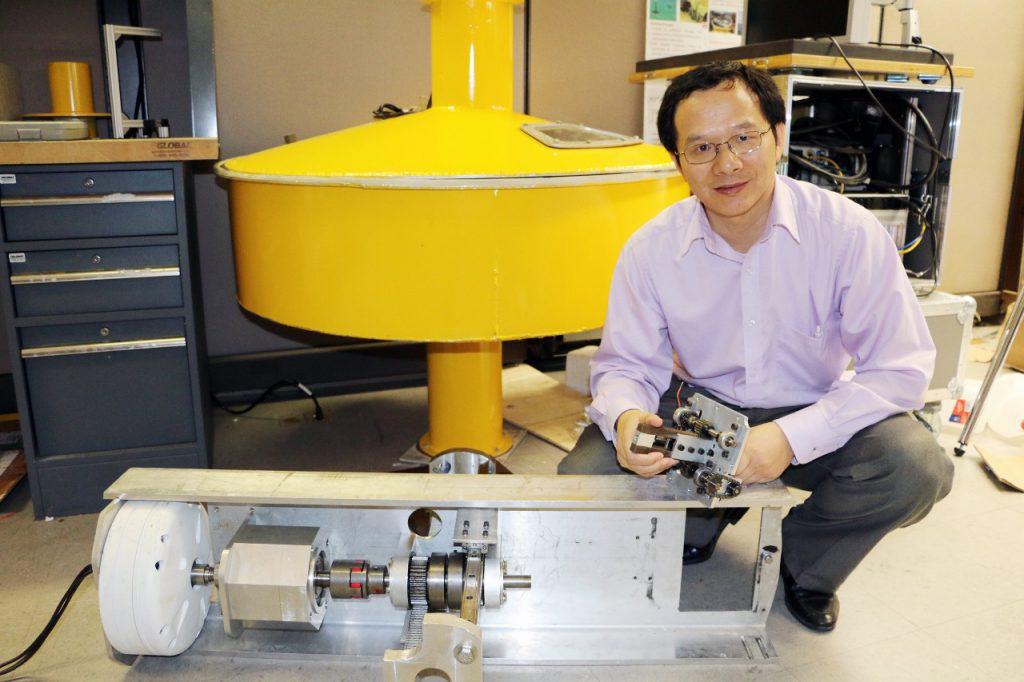Smaller isn’t always better, but when it comes to quantum engineering, quantum-scale developments are ready to change the world. “Electrical and computer engineering research is critical to a global effort to advance quantum engineering research and train the new generation of quantum engineers,” said Luke Lester, head of the Bradley Department of Electrical and Computer Engineering (ECE). “And our department is well positioned to be part of the quantum revolution.”
Quantum engineering is poised to revolutionize society, said Lester. It could improve our communications systems, bring us new methods for securing data, make our devices more energy efficient, and, of course, make computers smaller.
According to ECE professor Wayne Scales, who is working on the curriculum side of the department's efforts, quantum is the natural next step in computing, following mechanical switches and transistors, and the impact could be just as big.
Quantum engineering isn’t just our usual engineering on a smaller scale, however. At quantum levels, different physical laws and phenomena apply than what we’re used to at a larger scale. Quantum engineering requires interdisciplinary expertise, including electrical and computer engineering, materials science, computer science, physics, chemistry, and math.
Two new centers for quantum research
To overcome this interdisciplinary hurdle, Virginia Tech is forming two centers for quantum engineering — one in Blacksburg and one in Alexandria. These centers will bring together researchers from multiple fields to tackle quantum challenges.
The Center of Quantum Architecture and Software Development will be part of the Virginia Tech Innovation Campus in Alexandria and is partially funded by a $12.5 million gift from Northrup Grumman.
The Virginia Tech Center for Quantum Information Science and Engineering will be the Blacksburg-based complement of the Alexandria center and will tackle broad research topics from cryptography to atomic clocks.
ECE quantum research
Several ECE faculty members already have active quantum engineering research projects.

Lester, along with Mantu Hudait, associate professor of ECE, are researching quantum dot devices — and the materials needed to create them. Their team is crafting devices such as ultrafast lasers, single photon sources, and high-efficiency solar cells.
New Assistant Professor Linbo Shao is investigating quantum information processing on silicon substrates. These high-performance devices use microwave, acoustic, and optical devices.
Vassilios Kovanis, collegiate professor and Master of Engineering program director for Northern Virginia, is working on non-hermitian quantum mechanics that uses a combination of dissipation and unitarity in contrast to traditional quantum mechanics. Within this context, he is developing tunable photonic oscillators and photonic clocks as well as a variety of ultra-sensitive sensors.
Collegiate Assistant Professor Ravi Ragunathan is working on a quantum key distribution testbed that can integrate with cyber and radio-frequency modalities.
Quantum education
In addition to quantum research programs, ECE is developing a new curriculum and new courses to train the next generation of quantum engineers.
“It’s a big debate on how to train students in quantum engineering, because it’s so interdisciplinary,” said Scales.
Because this curriculum has potential to impact so many technology communities, both the Commonwealth Cyber Initiative and the Institute for Institute for Critical Technology and Applied Science have helped fund the laboratory development.
One thing that is a certainty for training quantum engineers: the need for a quantum laboratory course for hands-on learning. The course — taught for the first time during the spring semester — is intended for students in both engineering and science fields.
Currently, such experiential learning laboratory infrastructure is not common in the United States. The course is quantum photonics based and covers fundamental quantum science concepts, quantum communication, quantum cryptography, and quantum sensing. Although the course is initially taught at the graduate level, Scales plans to offer it to undergraduates — possibly even to those in their sophomore year.
Ultimately, Scales plans to offer a virtual laboratory as well as the in-person experience, enabling more students to gain access to this training. “You can log in remotely to the control panel, and run the experiments,” he said. Therefore, students on other campuses or other universities, as well as working professionals, could then benefit from the Virginia Tech lab.
Scales also is building partnerships with other universities that could then offer the laboratory as part of their programs — particularly universities that could help underrepresented minorities gain access to the tools. “It’s an enormous educational opportunity,” said Scales.
The course development doesn’t stop with universities, however. “Ultimately everything will have quantum devices, and we’ll need to train people at trade schools and community colleges in quantum concepts,” said Scales, “and even K-12 students. It’s a completely new way of thinking for the average person.”
The field is shifting, noted Scales, from being purely basic science. “It’s evolving to be it’s own engineering discipline, with critical new applications including cybersecurity, quantum communications, quantum sensing, and quantum materials.”




